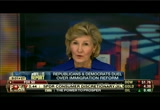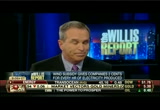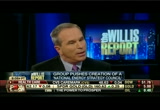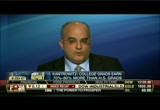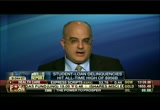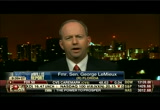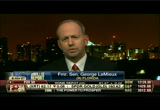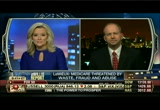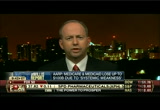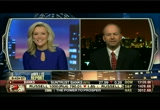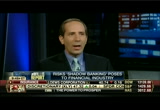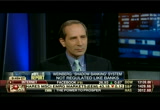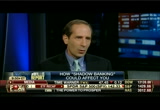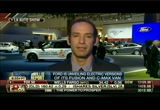tv The Willis Report FOX Business December 25, 2012 9:00pm-10:00pm EST
9:01 pm
gerri: hello, everybody, i'm gerri willis. one of the big issues congress is promising to tackle is immigration. congress passed the jobs act replaces green card lottery to permanent visas to those with doctorates in science, technology, engineering and math. two outgoing republican senators introducing legislation granting residence to those bought in the country illegally. though call it the achieve act, similar to the d.r.e.a.m. act. i spoke to one. bill's cosponsors, senator kay bailey hutchison. welcome to you here. how is your legislation different than the d.r.e.a.m. act? >> our legislation gives legal status to the young people in conundrum.
9:02 pm
they have grown up here. this is the country they know yet they are illegal because their parents brought them here before they were 14 years old. but we don't go into a citizenship track. we allow them to get in line behind the people who have been lawful and waited in line. so we don't give them a preference in line but we do give them a legal status and we don't prohibit them from getting in line if they choose to go the citizenship route. gerri: senator, what do you have to have to be able to be part of the program as you're defining it? >> you have to be under 14 when you came here and you have to be under 28 now. you can serve four years in the military or, you can have six years in which to get some kind of job training or degree. it can be college degree of course or a technical degree, vocational degree, something that gives you a skill and then, fro that point you would get al second visa
9:03 pm
that would allow you to work for four years and then have the ability to stay here as long as you want to and abide by the law. gerri: i want to ask you why it is important to have this legislation. one of the issues of course in the wake of the elections, a lot of critics of republicans said, the republican party in particular need to be more supportive of immigrants, have some kind of path to citizenship. ur legislation doesn't go that far. should it go further and why is it important to make at least some steps in the direction of helping people become more fully integrated into society? >> well, first of all we do welcome immigrants because there is a way to come into our country legally. what we're dealing with is people who have come illegally and in this case they are children who really didn't have a choice. and they are here and they have been educated in america and we're trying to give them a legal status
9:04 pm
that doesn't allow am fear of deportation. allows them go to college or go to school and stay here if they want to. if they want to become citizens, they can apply and get in line and abide by the law as it is today. we don't change the law. we don't prohibit them. but we don't give them the cut in line before the people who have it withed for years to get that green card or citizenship. gerri: i want to switch gears here a little bit. you wrote a op-ed, calling on washington, calling on congress and the president not to raise taxes on small business operators. what do you fear and what would you like to see hpen? >> i think we're going to just wreck this very fragile economy if we raise taxes on the people who are creating jobs. they want to create jobs. we need to give the people in small business a
9:05 pm
stability, and a predictability. they need to know what to expect and all the president talks about is more taxes and more taxes and more taxes. and, on top of health care, that's why we have not gotten really any better off in unemployment than when the president took office. i just think it's time for us to stop talking about making it harder to create jobs and instead, say we champion small business and we want you to grow and expand and give us a great economy by hiring people. gerri: senator, i li what you said about stability and predictability. i think that's what a lot of people are looking for out there. thanks for coming on the show. great to have you here. i hope you come back soon. >> thanks, gerri. i love being on. thank you. gerri: thank you. a federal tax credit for wind power producers expires in 2013. the obama administration is pushing for new taxpayer
9:06 pm
support for wind projects. with our budget deficit soaring an intense debate is heating up over whether the government should be throwing your tax dollars at industry the first place. i asked robert bryce, senior fellow at the manhattan institute about this issue. let's start with the tax credit. >> sure. gerri: this is industry, let's face it they don't have a whole lot to show for themselves yet we subsidize them to the tune of $1.2 billion. why? >> remember the industry said we're all about reducing carbon dioxide. that was the whole argument. now it shifted we create jobs argument. if congress does not extend production tax credit we'll lose 37,000 jobs. they might get an extension but there is big push among utilities, a lot of groups to end the tax credit and it very well could be ended. gerri: it doesn't work that well. 84% fail to produce electricity when the demand
9:07 pm
is great. as a solution to our energy problems how would you rate it? >> it is not a solution and it is wholly dependent on electric utilities and electric generation that can be dispatched. we can't count on wind. when demand is highest wind output is generally at its lowest. that's a big problem. gerri: irony, these anti-wind groups are growing in number. take a look at this. in the u.s. there are 100 groups. u.k., 200. europe, 500. what is going on? >> this is part of a growing global backlash against the wind industry. this is very successful rtraying itself as green. we produce green energy, green lech i very, reduce co2 emissions. when you look at countries around the world, australia, new zealand, huge backlash in ontio, we're seeing backlash against the large wind projects going in all over the place. gerri: talk about new york. you have an interesting example there. >> just last month lawyers here in new york filed
9:08 pm
lawsuits, 60 residents in herkimer county just north of albany, they filed a lawsuit saying these project, wind turbines, built within 1000 feet or so of residences are emitting all the noise, keeping them up at night, diminishing property values and they filed suit. i think it is indicative of the backlash. gerr this is interesting. you say this is the first time it will be heard in court of law, the issue about the sound. >> in the u.s., yes. gerri: seems to me that is pollution. >> sure it is. that is the part, exposes the double-standard, gerri. it just drives me crazy. where is the sierra club? where is greenpeace, natural resources defense council, so-called environmental groups, why aren't they sustainedding up for the small landowners? these people are really getting a raw deal and the wind energy companies of course are making handsome profits but these individual landowners are getting the short end of the stick. >> i wouldn't be happy if one of those set up next to me. >> you certainly would not.
9:09 pm
gerri: let me ask you about something called the energy strategy council. >> right. gerri: they're suggesting starting a national energy strategy council. >> sure. gerri: would come up with a policy, soup-to-nuts, every federal agency gets involved. possible? >> sure it is possible. this is the federal government after all but, what bothers me is that there are, this idea that we'll have quadrennial review, a 4-year plan just like the pentagon. i don't know that is the best model to work on. gerri: i have to ask you about bp today. >> sure. gerri: because there's big news coming from bp. the federal government says you're disqualified from winning new contracts. here's bp statement. suspension that is due to bp's lack of business integrity as dep straighted by the company's conduct with regard to the deepwater horizon blowout explosion, oil spill and response. now the stock did not really get hit today. what is your estimate what this means? >> i think it will be a temporary move. i think the obama
9:10 pm
administration again is wanting to show, hold up bp, that we're punishing them. this is enormous company. it is one of the biggest oil and gas producers in the u.s.. gerri: doesn't it matter if it loses contracts from the u.s.? >> they have a lot of contracts already. so those contracts don't go away. there is enonly on new contracts. it is important but i think it is a temporary deal. gerri: robert, you must come back and sit on the set again. always a pleasure. >> always happy to be here, gerri. gerri: still ahead tonight, a mountain of new regulations coming our way next year thanks to congress. we'll break it down. president obama promised to end crony capitalism. how is he doing? we'll have a report card.
9:13 pm
9:14 pm
still under review by the obama administration could cost $106 billion before the end of the year. the biggest culprits? the epa and the energy department. here to explain the director of regulation policy for the american action forum. sam, welcome. i want to start with this $106 billion number we were talking about in the break. this is a lot of money. so $106 billion. these are rules that are still being written that were supposed to go into place sometime this year. this as the laws not already on the books, this is what is coming. tell us about that. >> correct. for example, there are 25 economically significant regulation at the white house now, that is regulations with a economic impact of $100 million or more. some are rules under the affordable care act, menu labeling rules, rules for vending machines, labeling requirements. so there is a lot at the white house now. there is lot of rules that are passed their statutory deadline. past the deadline for the administration set for them,
9:15 pm
that have been waiting around for several months. we don't know why. you can assume might be because of the election because the pace we're on right now is significantly lower than other re-election years. for example, 2008,004, and 2000. gerri: you say more than 80% of the rules have been under review for 90 plus days. why does it take so long? look, i don't even want to see the rules come into place but at end of the day they should have some efficiency about enacting them and writing them down? >> sure. well the biggest issue is transparency. you mentioned the 90-day threshold. under executive orders, 90 days is supposed to be the maximum. roughly 80% of the rules have been there longer than 90 days. this is really unprecedented. part of the issue as i mentioned is transparency the white house under law is supposed to release two unified agendas of regulations each year and the last one they issued was for last fall. even that one was late. we don't have one for 2012 at all. we have no clue really beyond what is at the white house what is
9:16 pm
scheduled for 2013 and 2014. members of the house oversight committee --. gerri: talk about your transparency problem. that is a big transparency problem. we were showing our viewers over your shoulder a list of regs coming. some include epa boiler rules which will put significant burden with people who own factories and buildings everywhere. this is something people are really worried about. what is potential cost of something like that. >> sure. several billions of dollars. that bill has been in and out of the regulatory process. they tried to finalize it last year. it has been kick around the courts. surprisingly enough it received blowback from even moderate senators. for example, two senators from maine are very worried about the boiler regulation. it has been at the white house for a while as well. and, it is just a matter of time. they will not hold onto the rules forever. likely they will be released this winter or sometime in the spring. gerri: we've got final rules for labeling requirements
9:17 pm
under obamacare. we've got, what i think is the farm dust rule, particulat matter rule. is that farm dust? >> well, epa stressed that farmers don't have to worry about the rule and, if you look compared to the other rules it is sort of seems like a drop in the bucket of $69 million. according to epa's projections only a few counties that wouldn't be compliant. there are other rules. for example, the cooling water standards rule that would regulate power plants and how theyse cooling water during the electric generation process. so the department of energy and epa are really busy, have a lot of rules that have been at the white house longer than the 0 days. gerri: no kidding. you have another interesting number. you say 19,000 employees are devoted to red tape. tell me about that. >> sure. if you look at the aggregate paperwork compliance burden of all the rules there is roughly 37 million hours. that 37 million hours, take productive work year roughly,
9:18 pm
2,000 work hours, divide by 37 million. roughly 19,000 full-time equivalent employees. in theory those are solely dedicated to red tape compliance. gerri: sam, quickly what type of grade would you give the obama administration as transparency. >> he is supposed to publish two unified agendas. the white house has not published any and given no reason why they haven't published any. we're still clueless why they're not obeying the regulatory flexibility act. gerri: no clue but i guess transparency is in the eye of the beholder. sam, thanks for your time. >> thank you for having me. >> thank you for having me. gerri: we'll be right back.so as customer satisfaction is at 97%. mmmm tasty. and cut! very good. people are always asking me how we make these geico adverts. so we're taking you behind the scenes. this coffee cup, for example, is computer animated.
9:19 pm
it's not real. geico's customer satisfaction is quite real though. this computer-animated coffee tastes dreadful. geico. 15 minutes could save you 15 % or more on car insurance. someone get me a latte will ya, please? i honestly loved smoking, and i honestly didn't think i would ever quit. [ male announcer ] along with support, chantix is proven to help people quit smoking. it reduces the urge to smoke. it put me at ease that you could smoke on the first week. [ male announcer ] some people had changes in behavior, thinking or mood, hostility, agitation, depressed mood and suicidal thoughts or actions while taking or after stopping chantix. if you notice any of these stop taking chantix and call your doctor right away. tell your doctor about any history of depreion or other mental health problems, which could get worse while taking chantix. dot take chantix if you've had a serious allergic or skin reaction to it. if you develop these stop taking chantix and see your doctor right away as some can be life-threatening. if you have a history heart or blood vsel problems, tell your doctor if you have new or worse symptoms. get medical help right away
9:20 pm
if you have symptoms of a heart attack. use caution when driving or operating machinery. common side effects include nausea, trouble sleeping and unusual dreams. with chantix and with the support system it worked. it worked for me. [ male announcer ] ask your doctor if chantix is right for you. gerri: president obama promised to end the cozy relationship between special interests and politicians. after four years how
9:22 pm
gerri: electric cars, remember the dream? that's the president's dream. listen to this. >> we can break our dependence on oil with biofuels and become the first country to have a million electric vehicles on the road by 2015. [applause] gerri: kumbaya. a million electric cars on the road by 2015. save the planet. save the gas. wait, somebody forgot to tell consumers. despite tax credits of up to $7500 to buy the models, just 18,000, just 18,000 were sold in 2011. boy, at that rate we'll have a million green cars on the road by, 2067. or 55 years from now. incredible. where did we go wrong? it's easy. government government involved. the feds are no good at picking what technologies
9:23 pm
regular americans are going to glom on to. did the department of energy create amazon.com so people would save gas driving to the mall? no, they did not. did the post office invent skype so people could get in touch more inexpensively? no, they did not. breakthrough products invented by private companies. let's stick to cars since that's where we started. model t, 104 years ago the nation's first touring vehicle was first produced on an assembly line. henry ford said his car was for the great multitude and how 16.5 million model-ts were eventually sold. 16 1/2. how about the biggest selling americ made vehicle ever, ford f-series, trucks. amazing 35 million of those were sold since the trucks were introduced way back in 1948 and it is ranked as the number one sellin vehicle in the u.s. for 24 years. and now, you can trick them out just like a sedan with tv screens, high-tech sound
9:24 pm
systems, even back seats. but none of this, none of this required a tax benefit to boost sales. that is the problem. when government starts tinkering, al lining its priorities with the private sector, you get the chevy volt, fannie mae, freddie mac, all disasters, all costing the taxpayer. for more on this on crony capitalism, i'm joined by tim carney, senior political columnist by the "washington examiner" author of book, obama-nomics and how barack obama is bankrupting you and enriching his are corporate friends, wall street lobbyists. this is the perfect guest for this siggment. thanks for coming in. appreciate you being here. what can we look forward to in the next four years do you think when it comes to crony capitalism? >> barack obama will be pro-business in his own way, which is also pro-government. in other words he will be subsidizing industries he wants to succeed, regulating in a way that protects the
9:25 pm
biggest businesses in some industries and making sure that people don't make profits in ways that he doesn't want to succeed. you will see a lot more green energy stuff you saw in the stimulus bill and that he tried to push forward in his climate change bill. he will generally see a lot of guys who hire the best lobbyists will get ahead because they will get the sort of big govnment favors that happen when government involves itself more and more in private industry. gerri: you know, i find that nobody, nobody is more relentless in pursuing taxpayer dollars that ty have access to them than the companies, than capitalists. because they put their entire business model around this idea of getting the free money. >> yep. gerri: they are relentless in their pursuit. you've been studying this for a long time. do you agree? >> yes. and so the problem is in a free market economy when people try to pursue prot, what they're trying to do is produce something that people actually want to buy. but once government starts to get involved you get companies like general electric who say,
9:26 pm
well, the best investment we can make is investing lots of money in lobbyists or employ a thousand people in the tax division to game. go, game regulations. suddenly profit is not a catch to producing something of value but it is attached to gaming government, gaming regulations, tax code and handouts. and that sul of sudden where you get liberals think capitalism always is, profit doesn't involve trying to deliver something when you want but gaming the system. gerri: smart stuff, tim. thanks for coming on. you have got to come back soon. >> i sure will. gerri: when we come back should entitlement reforms be on the table in washington? the latest on medicare, next.
9:29 pm
9:30 pm
at student loans, that is what i'm talking about, escalating intoou nosebleed territory with delinquencies rates at a new all-time high outstripping any other consumer debt. our student loans the new subprime loan? joining me now, spokesman for the young american foundation. thank you for joining us. we really appreciate your time. the president is talking about higher education and how it should be an economic imperative. listen to this. >> a higher education is no longer a luxury. it is an economic imperative in the 21st century. it is part of what we nee to succeed in this global economy. and i'm going to fight for every young person is willing to work hard to get an education. gerri: should everyone hava college degree? >> if i was the president, i think you might has well said
9:31 pm
let me be clear. every student should start with 30,000 dollars of debt and maybe a bankruptcy. it's absolutely asinine. the current system we have in place is nothing short of immoral. we are putting students that it is economically imperative for them to get an education, but then we are putting them in that situation a situation was. not only are there no jobs, starting with 30,000 dollars of debt is not a way to start your life. gerri: let's get marked in him. i'm going to give you more time. we would like to get more time. mark, is it asinine to these kids start their lives with so much debt and give it to everybody? >> well, college benefits -- the students who have college degrees earn 70 to 80% modents e degrees earn 70 to 80% more. the federal government gets twice as much federal income revenue from someone with a college read this one without. it is an investment of book the future of the individual in the country. gerri: okay, what do you think?
9:32 pm
>> revenue? are you kidding me? you think they would be going to college without this program? that's asinine and not true. saying that you cannot raise tuition as much in two years. having futures go up, while you better your product and make it worthwhile in a portable. it is not that way right now. it's hurting my generation. i get to be on tv, but guess what? i'm still struggling to pay my loans because of the system. gerri: all right, we will let mark getting it. this is an interesting point. there are no controls. where are the controls? gerri: is thatany way to treat our taxpayer dollars? >> the federal governmentschool
9:33 pm
is to enable access college education. we have twice as many people in college now visited several decades ago. the problem is that the government is not focused on the possibilities. but the government needs to do is make their own limits contingent upon what the next generation will do in regards to paying back the debt or not. >> government picking winners and losers -- would you ever get a loan to someone who could not get back? no, you ouldn't. if iwas a private investor, they could help the students and measure whether or not whether they are getting something that is worth something. the government can't do that. i don't think it's fair either. that is why it has to be a private thing. the only thing that is fairer. gerri: mark coming into this question. what would have been a college education -- the system in this
9:34 pm
country -- it's all public dollars were pulled out. >> welcome you have a glass of higher education. you have only the wealthy going to college. you would have of the college is failing. the private sector is not willing to fund loans to every student. they are no more capable of choosing how to fund loans appropriately than the federal government. just look at what happened in 2008. we went from 16 to two dozen. >> but it is being subsidized by the government. gerri: you make the point that the public sector should be completely out. mark says they can't do that because there would be no college education. he responded that? >> marks in two minutes ago that the sector is profitable and brings the government money by lending it out. i think the private sector can
9:35 pm
turn something up profitable and that way higher education can't run roughshod over my generation gerri: the last word, mark? >> well, what we need to do is reduce the shift from government investment where they have been reducing the grants on a per capita basis and invest more in in the grants. >> more grants, more money. batna. trillion dollars worth of student loans. great idea. gerri: all right, you agree to gerri: all right, you agree to disagree
9:37 pm
- ♪ livin' in this cr♪ ♪ so caught up the confusion ♪ ♪ nothin' is makin' sense ♪ for me and you ♪ maybe we can find a way ♪ there's got to be solutions ♪ ♪ how to make a brighter day ♪ what do we do? ♪ we've got to give a little love ♪ ♪ have a little hope ♪ make this world a little better ♪ - ♪ make it a better world - ♪ try a little more ♪ harder than before
9:39 pm
gerri: medicare. the largest expenditure in the federal budget, our country's debt problems deepening by the day but many democrats fail to acknowledge elephant in the room. our next guest says there's a lot of tough talk and little action on that front. i recently sat down with former republican senator of florida. >> you don't reform the way we pay out medicare, to be one of the things that breaks the bank and makes us unable to meet our obligations, so we absolutely have to reformat and the legislation i wrote back in 2010 that we passed with bipartisan support signed by the president went o after something everybody is against, and that is fraud. gerri: let's get to that in a second, but i want to spend one more second on this idea, democrats from illinois saying on tv he would like to see $400 billion in entitlement
9:40 pm
cuts. defense and interest. the ones grown the most are medicare and medicaid. we have to do something to stop the increase in the amount or it will swallow the rest of the budget. continuing to run these huge deficits. gerri: it will take over our budget, the only thing we pay for. as you pointed out, the services found we can't even get the front portion of this right. this is a topic you're very interested in. we're trying to find fraud and found 20 million in overpayment. what is wrong with the system here? >> it is the bureaucrats implementing what is a good law.
9:41 pm
what we did was follow the credit card industry does. many of your viewers have had transactions on the credit card for the credit card company called and said there is a fraud alert on your card, did you really do that transaction? that is computer modeling looking at your spending habits and sees if they're in the normal course of your spending and if they are not, the computer puts up the red flag and they check with you and if you say no, they don't pay. but to something working in the private sector, $2 trillion credit card business paying very little in fraud, stop the fraud and let's apply that to medicare. between medicare and medicaid there was $100 billion of health care fraud. unfortunately the bureaucrats in washington haven't implemented correctly, gave up the contracts to two companies who don't have any experience in this area, and we believe in outside groups at the time we could stop up to 20
9:42 pm
early in dollars per year in fraud by implementing this law that was passed in the correct way. unfortunately it is not being done. gerri: it is astonishing to me how many ways you can map this up. and yet president obama said he is working very hard at stopping fraud, here's the president. >> we went after medical fraud in medicare and medicaid very aggressively, more aggressively than ever before. $50 billion of waste taking out of the system. gerri: the white house done a good job of this? >> the heaven, unfortunately. i'm not sure this president even knows what is happening. the $50 billion number, don't know what he gets that number from. the government accounting office has said that they stop $7000 in overpayment. $7000 in overpayment after spending tens of millions of dollars to implement this incorrectly.
9:43 pm
where i live in south florida, where the health care fraud capital of the country. we have prosecutors doing a good job blocking these people up who have stolen millions, sometimes tens of millions of dollars, but we don't get the money back. stop the fraud before it starts. gerri: senator, how does it do that? >> somebody orders 100 wheelchairs in an hour. the computer will say that it's out of the normal course. the red flag goes up. it has to happen and whic then s not happening now, the provider sends for reimbursement, the payment can't be made until the red flag is checked out. that is what the credit card companies do. this isn't rocket science. when the red flag goes up, don't pay until you verify. we will save tens of billions of
9:44 pm
dollars and put more money back and medicare, which will make it more solvent. gerri: goodness sakes, you are suggesting we adopt private sector ideas to the public sector system? thank you for coming on, a plsure to talk to you. you have got to come back soon. >> thank youo much, enjoyed being on. gerri: thank you. coming up and we go to t l.a. auto show and show you the hottest trends of all things cars. and looking ahead to 2013 at the next threat to the financial system. when nobody is talking about it. we will next. [ malennouncer ] it's tt time of year again. time for citi price rewind. because your daughter really wants that pink castle thing. and you realldon't want to pay more than you have to. only citi price rewind automatically searches for the lowest price. and if it findone, you get refunded the difference. just use your citi card and register your purchase online. have a super sparkly day! ok.
9:45 pm
9:46 pm
and there's a big advantage parents can give their kids -- making sure they get active at least 60 minutes each day. studies show that physical activity not only helps kids stay healthy, it can enhance important skills, like concentration and problem solving, which can improve academic performance. this means physical activity can help your kids in the most important game of all -- life.
9:48 pm
gerri: it is called the shadowdo banking system, hedge fund, money market fund, any lender typically not aw st bank and bld by many for the global financial crisis. they're bigger than ever at $67 trillion in terms of assets accordinto an report from the financial stabilityrd board. i asked editor-in-chief ofnanc american banker about the risks it poses to the total financial system. >> essays on the financial to system, these were people who were in the business of lendinge money, of investing that are not regulated like a lot of banks so nobody really knows what they're doing.th it is sort of a block box.with gerri: we have no idea they're maintaining any kind of standards we expect out of the banks. banks are highly regulated entities. >> they can get in trouble as
9:49 pm
well. they have regulators worth watching closely and a lot of the shadow banks don't. if you'r your hedge fund were ly regulated. y be and you have things like money market funds which we saw with the real problem for small investors because the primary reserve fund went under. it created a panic. and created a panic. gerri: one of the big concerns out there, $67 trillion globally and the u.s. leads the way. how big is that, how big a problem could it be? >> when you think there lightly regulated and in the united states, the shadow banks have assets of half as much as the banks. they don't live in a world that is separate from banks and other pieces of the economy so if they get into trouble you have counterparty risk. if i owe you money and get in
9:50 pm
trouble it is your problem as well. it is closely intertwined. we saw this in 1998 with long-term capital management. no one had ever heard of it and this hedge fund got into trouble and it was deemed by wall street and the federal reserve to pose a systemic risk to the whole financial system so we never heard of it but had to bail out. gerri: do we need more regulation? that is the first in a lot of people wouldld say? >> first thing regulators want to do is regulate and they want a lot of complicated regulation. i don't think that is the answer but bringing this stuff out into the sunlight making these shadow banks show what sort of risks are opposed to the system would be a really good start so at least we have a sense of what is going on. gerri: for the regular american out there there's a whole world that is completely closed to them, has nothing to do with them but at the end of the day could make big trouble for regular investors. give us an example of how this
9:51 pm
could unwind. >> as we saw with money-market funds which was for mom-and-pop investors but what you had was something people thought was safe and stable and as it turned out when one of these funds started to get into ouble there was a risk that the whole industry, $2.5 trillion industry could suddenly have a huge run on its money, there would be a lot of other financial institutions in trble so it could have three knockoff affects. it could have a systemic effect, it could mean your government has to bail amount which year taxpayer money and one of your investments is in trouble. gerri: i hate to get when a taxpayer money. >> thank you. heahadto the l.a. auto show. is green still a trend? find out next.
9:55 pm
gerri: world'stests gerri: the world's hottest cars are taking the stage for the 2012 los angeles auto show. automakers unvei unveiling near0 new vehicles. including world first from chrysler, ford, gm, bmw andswag volkswagen. a sneak peak before friday's public debut, consumer reports is live in los angeles with the very latest. you here. such a fun segmentment tell me, first, what trends are you seeing out there? something that might be new or different that peole can expect coming up. >> sure. the l.a. show, you see a lot of electric cars, fuel efficient cars. there are the electric cars, but we're seeing a lot of normal cars getting more and more fuel efficient. everything's more fuel efficient and keeping the function. gerri: you said utility is a big thing. what do you mean by that? >> utility, i mean, you know, people think you get a fuel
9:56 pm
first time car, it's a little tiny box that crries two people, and they are cramped in like a smart car, something like that, but ford here, they have a seven passenger vehicle over 30 miles per gallon, looking at suvs that can do things, carry things, and still get great fuel economy. gerri: working through the makes and models that you really like here. you want to start with the tesla. >> sure. it looks to be an amazing screak. ww have not purchased one or tested it, but i have driven it, it's a ridiculous vehicle. it's so fast, so roomy. feels like you are driving a ferarri with room for five. it's really more fuel efficient than a prius. gerri: didn't tesla have trouble in the past and "consumer reports" having trouble test the cars in the past? i'm surpred you're so excited. >> well, no, no, it's not.
9:57 pm
people get different electric car makers mixed up. that's a crime. there's fisker and tesla, totally different companies. just because one has problems, doesn't mean the other is going to. they supply technology to toyota for electric vehicles. it's a proven company that has a record, my, on the other hand, just building this one feck, and it's really, seems to be riddled with problems. gerri: all right. talk about the audi a7. i love the audis. >> it's a wonderful car, drives great, nicely finished inside, and, you know, here's what blew us away, we look at t reliability information, and we have a reliability information from 1.2 million vehicles saying what went wrong with the cars, and audi is reliable. that floored us. traditionally they have a lot of issues, but not anymore. they are up there with the japanese.
9:58 pm
gerri: interesting. what about hyundai velociter. impressive name. i wonderrhow much time they spent thinking that name up. >> it has nothing to do with the dinosaur it's based on. it's quick, fun little car. what's intriguing is it's a sub compact, a cheap little fuel first time car, but looks sporty and drives sporty too. it fitses four people well. you can have it do everything sometimes right. gerri: okay. what about the scion? >> ha-ha! i'm six-foot tall. the frs, one of my favorites, again, fun, tossble, back to the basics car. it's a gift to car enthusiast. gerri: luxury cars up 10% this year, recession, maybe not, speaking to the economy. jake, thanks for coming on tonight.
9:59 pm
great to have you on. >> you're welcome. fun being on. have a great night. green cars seem to be all the rage at the car shows every year, but they are not catching on with consumers despite president obama's dream of a million electric vehicles on the road by 2012, and 2011, only only 18,000 units sold, that's a bummer. in tonight's top five, the best selling electric cars in the u.s. so far this year, number five, ford focus electric. now, through august of this year, ford sold fewer than 200 of the vehicles. they didn't reach the lots until may. four, the mitts bee shy, sales up 400% to a whopping 403 cars. knee san, number one seller last year, only four people drove away in a leaf. oh, boy, the cousin of the best selling
113 Views
IN COLLECTIONS
FOX Business Television Archive
Television Archive  Television Archive News Search Service
Television Archive News Search Service 
Uploaded by TV Archive on

 Live Music Archive
Live Music Archive Librivox Free Audio
Librivox Free Audio Metropolitan Museum
Metropolitan Museum Cleveland Museum of Art
Cleveland Museum of Art Internet Arcade
Internet Arcade Console Living Room
Console Living Room Books to Borrow
Books to Borrow Open Library
Open Library TV News
TV News Understanding 9/11
Understanding 9/11


